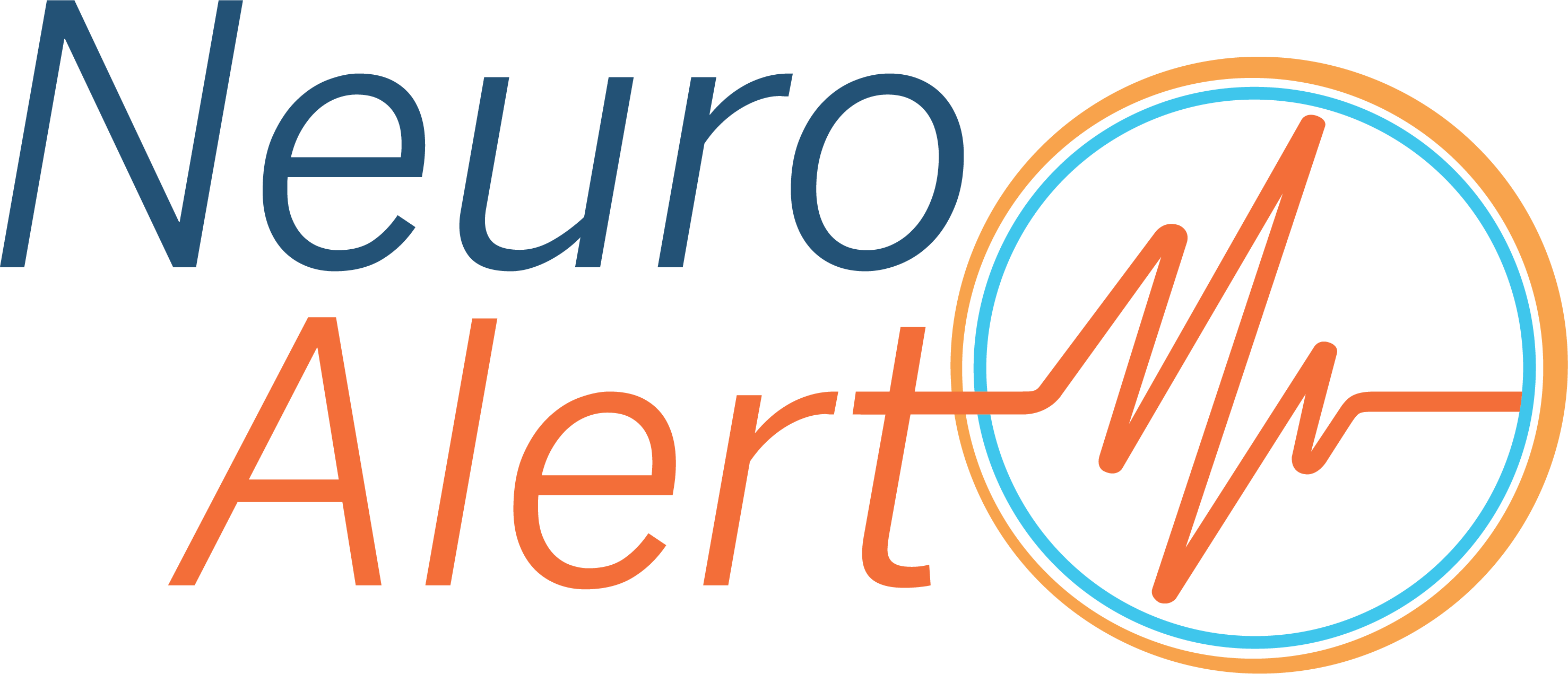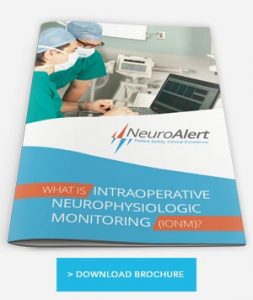Intraoperative Neuromonitoring (IONM) is an impressive safety net second to none that protects an anesthetized patient’s neuromuscular system. Neuro Alert’s advanced technical monitoring procedures are set up to detect any neurological deficits during surgeries. Simply put, it allows surgeons to obtain instant and reliable feedback about a patient’s nervous system without performing a “wake-up test.”
To accomplish this, sensors are placed along the neurological structures and/or muscles that are recorded and analyzed by both the on-site neurodiagnostic technologist and the remote reading physician. The neurodiagnostic technologist and reading physician communicate in real-time and provide feedback to the surgeon. Surgical innovations like IONM enable a surgical team to promptly take any necessary corrective action during a procedure to help minimize risk of postoperative neurological deficits.
We’re happy to answer any questions — simply visit our contact page and email or call us to start a conversation.
Ask your doctor about neuromonitoring
Neuro Alert respects and supports your doctor’s plan for treatment. We encourage an open dialogue between doctor and patient. IONM is a valuable adjunctive service that can support a surgeon in making appropriate and informed decisions in the operating room relating to his or her patient’s neuromuscular system.
We urge you to consult with your doctor on any information concerning IONM and neurodiagnostics.
Questions to ask your surgeon
Perhaps you or your family member’s condition warrants a surgical procedure. If the procedure is a spinal surgery, brain surgery, vascular surgery, ENT surgery or other procedure that may affect your nervous system, your surgeon may choose to use Intraoperative Neuromonitoring (IONM).
IONM tests are designed to detect potential surgical injuries before they happen. To help you better navigate conversations about neuromonitoring with your surgeon, below are several questions to consider asking:
- How many surgeries similar to mine do you perform annually?
- Do you routinely use neuromonitoring when performing surgery?
- Will you be using neuromonitoring throughout my surgery? If not, why?
- What types of testing will be performed during my surgery, and what information will it provide you?
- Who performs your neuromonitoring? Is it a company you selected, or does the hospital where my surgery will be performed have a team?
- How experienced are the clinicians who will be performing the neuromonitoring? Do they have their CNIM certification?
- Will the neuromonitoring receive real-time oversight by a remote supervising physician?
Patient rights and responsibilities
Patient Rights
- You have the right to considerate and respectful care while intraoperative monitoring services are being provided.
- You have the right to privacy regarding any aspects of your surgery or care. Any discussion about the monitoring to be provided during your surgery will be conducted in a discreet manner.
- You are entitled to information about intraoperative monitoring and what procedures will be performed during your surgery.
- You are entitled to know the name of the surgical neurophysiologist who will be responsible for your monitoring.
- You have the right to refuse intraoperative monitoring and the right to be informed of the medical consequences of doing so.
- You have the right to expect that all communications and records pertaining to your monitoring will be treated as confidential, except as otherwise required by law.
- You have the right to review the monitoring report and to have the information explained at your request.
- You have the right to know about business relationships with Neuro Alert, including ties to educational institutions, other healthcare providers or payers that may influence the patient’s treatment and care.
- You have the right to examine and receive explanation of any bill for monitoring services, regardless of the source of payment (if applicable).
- You have the right to voice concerns regarding the monitoring services provided, to have your concerns reviewed and, when possible, resolved.
Patient responsibilities
Patients are responsible for honoring financial commitments for the monitoring services provided, as applicable.
- Patients are responsible for observing the rules and regulations of the hospital or other facility where he/she is being treated, including in relation to receipt of monitoring services.
- Patients are responsible for providing monitoring personnel with accurate and complete information regarding past medical history, as applicable.
Reporting of quality and safety concerns
An effective patient safety program (see patient safety plan) cannot exist without optimal reporting of medical/surgical health care errors and occurrences. Therefore, it is the intent of Neuro Alert Monitoring Services to adopt a non-punitive approach of its management errors and occurrences. All personnel are required to report suspected and identified medical/healthcare errors and should do so without fear of reprisal in relation to their employment.
Neuro Alert Monitoring Services believes that errors occur due to a breakdown in systems and processes and focuses on improving systems and processes, rather than disciplining those responsible for errors and occurrences.
Any employee/licensed independent practitioner (LIP)/contracted staff who have concerns about the safety or quality of care provided at this facility are encouraged to report these concerns to:
- Chief Physician
- Chief Clinical Officer
- Their supervisor
- Safety Officer
- Administration/Medical Director
- Chief Executive Officer
- Administrative Services Manager
The following are exceptions to non-punitive reporting:
- Knowingly intentional acts with intent to harm or deceive a patient. (See abuse and neglect policies and procedures).
- In the event it becomes clear that staff competency is the root cause for a pattern of errors, management will make every reasonable effort to ensure staff can reliably deliver safe care. If it becomes clear that a staff member cannot practice in a reliably safe manner, despite education and counseling, the situation will be treated as a staff competence issue through normal disciplinary procedures.
Reporting to the Joint Commission:
- Employees/LIPs/contracted staff who have concerns about safety or quality of care provided may report these concerns to The Joint Commission.
- No disciplinary or retaliatory action will be taken against an employee for reporting safety/quality concerns.
The Joint Commission may be contacted at 1-800-994-6641 or 1-630-792-5000, faxed at 1-630-792-5636, emailed at [email protected] and is accessible at www.jointcommission.org.
Patient safety
IONM has quickly become the standard of care for many spine and neurological surgeries. Our founder is a patient advocate and has been providing IONM services since 1982. Neuro Alert ensures that our entire staff of surgical neurophysiologists is extensively trained, and our reading physicians are all board certified. Neuro Alert’s primary focus is on improving patient safety.
All of Neuro Alert’s surgical neurophysiologist are trained in the latest neuromonitoring techniques and complete continuing medical education courses and programs annually.


